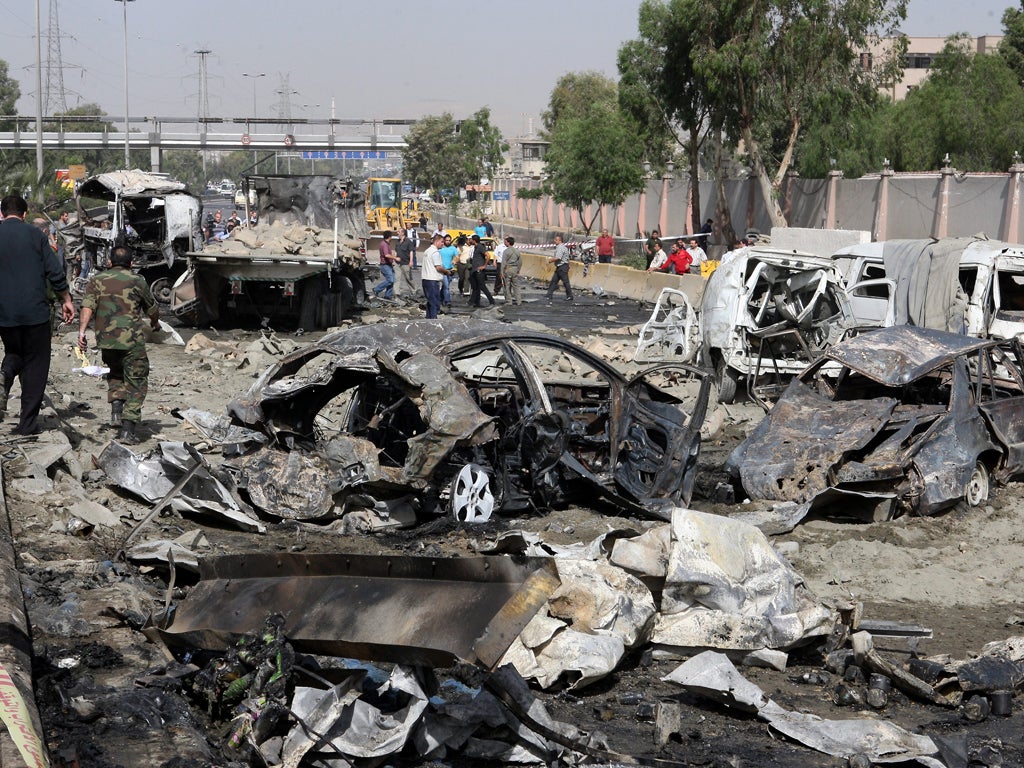Scores killed and wounded in Damascus suicide blasts

Your support helps us to tell the story
From reproductive rights to climate change to Big Tech, The Independent is on the ground when the story is developing. Whether it's investigating the financials of Elon Musk's pro-Trump PAC or producing our latest documentary, 'The A Word', which shines a light on the American women fighting for reproductive rights, we know how important it is to parse out the facts from the messaging.
At such a critical moment in US history, we need reporters on the ground. Your donation allows us to keep sending journalists to speak to both sides of the story.
The Independent is trusted by Americans across the entire political spectrum. And unlike many other quality news outlets, we choose not to lock Americans out of our reporting and analysis with paywalls. We believe quality journalism should be available to everyone, paid for by those who can afford it.
Your support makes all the difference.Two suicide car bombs ripped through the Syrian capital today, killing 55 people and tearing the facade off a military intelligence building in the deadliest explosions since the country's uprising began 14 months ago.
Residents said the blasts happened in quick succession during morning rush hour, with an initial small explosion followed by a larger bomb that appeared aimed at onlookers and rescue crews arriving at the scene.
Paramedics wearing rubber gloves collected human remains from the pavement as heavily damaged cars and pickup trucks smouldered.
There was no claim of responsibility but an al Qaida-inspired group has claimed responsibility for several past explosions, raising fears that terrorist groups are entering the fray and exploiting the chaos.
In addition to the 55 dead, the interior ministry also said there were 15 bags of human remains.
More than 370 people were wounded. in the attack. The explosives weighed more than 1,000 kilos (2,200 lbs).
The US condemned the attack, with State Department spokeswoman Victoria Nuland saying "any and all violence that results in the indiscriminate killing and injury of civilians is reprehensible and cannot be justified."
Central Damascus is under the tight control of forces loyal to President Bashar Assad but has been struck by several bomb attacks, often targeting security installations or convoys, since the revolt against him began in March 2011.
But the previous attacks happened on a weekend when many people stay home from work, making it less likely for civilians to be killed.
Today's blast was similar to attacks waged by al Qaida in Iraq, which would bolster past allegations by top US intelligence officials that the terror network from the neighbouring country was the likely culprit behind previous bombings in Syria. That raises the possibility that its fighters are infiltrating across the border to take advantage of the political turmoil.
A shadowy group called the Al-Nusra Front has claimed responsibility for some of the attacks in statements posted on militant websites. Western intelligence officials say it could be a front for al Qaida's Iraq branch.
Al Qaida leader Ayman al-Zawahri called for Mr Assad's removal in February.
The Syrian government blames the bombings on the terrorists it says are behind the uprising, which has been the most potent challenge to the Assad family dynasty in Syria in four decades. But opposition leaders and activists routinely blame the regime for orchestrating the attacks.
Syria's state-run news agency, SANA, posted gruesome pictures of the corpses, possibly to shock Syrians into abandoning any support for the opposition.
Maj Gen Robert Mood, the Norwegian head of the UN's ceasefire monitors in the country, toured the site and said the Syrian people do not deserve this "terrible violence."
The relentless violence in the country has brought a ceasefire plan brokered by special envoy Kofi Annan to the brink of collapse. The UN said weeks ago that more than 9,000 people had been killed. Hundreds more have died since as the conflict has become increasingly militarised, with protesters taking up arms or joining forces with army defectors to fight a brutal crackdown by regime forces.
Mr Annan appealed for calm and an end to bloodshed.
"The Syrian people have already suffered too much," he said in a statement.
Syrian TV showed shaken young girls in tears who said they were in the nearby Qazaz First Elementary School when the blast occurred. An hour after the blast, the school's gates were closed and no one was inside.
Foreign Ministry spokesman Jihad Makdissi posted a message on his Facebook page urging people to go to hospitals to donate blood.
International diplomacy has failed to stop the bloodshed, and the UN has ruled out military intervention.
Mr Annan brokered a peace plan last month, but the initiative has been troubled from the start, with government troops shelling opposition areas and rebels attacking military convoys and checkpoints after the cease-fire was supposed to begin on April 12.
A team of 70 UN military observers now in Syria should grow to more than 100 in the coming days. A full team of 300 is expected by the end of the month to oversee a cease-fire intended to allow for talks on a political solution to the conflict.
AP
Join our commenting forum
Join thought-provoking conversations, follow other Independent readers and see their replies
Comments